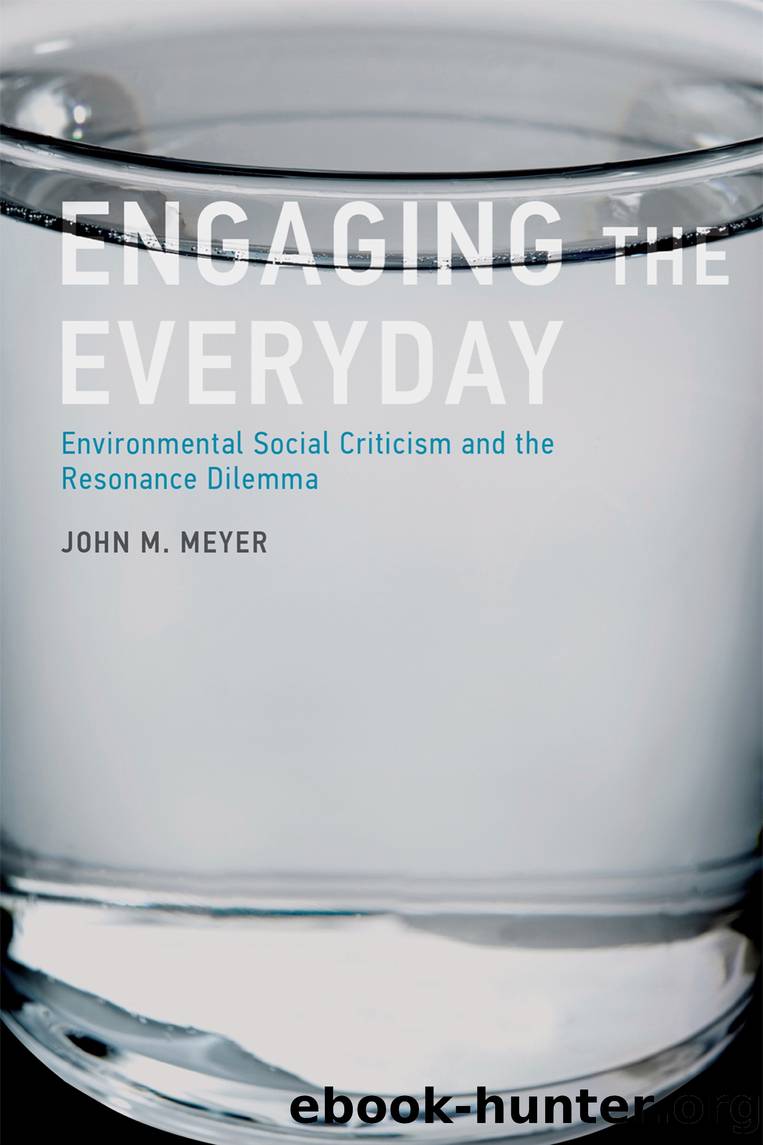Engaging the Everyday by Meyer John M.;

Author:Meyer, John M.; [Meyer, John M.]
Language: eng
Format: epub
Publisher: MIT Press
Published: 2016-12-05T00:00:00+00:00
7
Homes, Household Practices, and the Domain(s) of Citizenship
If the core problem of wilderness is that it distances us too much from the very things it teaches us to value, then the question we must ask is what it can tell us about home, the place where we actually live. How can we take the positive values we associate with wilderness and bring them closer to home? . . . we need to discover a common middle ground in which all of these things, from the city to the wilderness, can somehow be encompassed in the word âhome.â Home, after all, is the place where finally we make our living. It is the place for which we take responsibility, the place we try to sustain so we can pass on what is best in it (and in ourselves) to our children.
âWilliam Cronon, âThe Trouble with Wildernessâ 1
The point is that all green actions in the home have a public impact, in the specific sense of the creation of an ecological footprint. This, in turn, potentially generates the kinds of obligations I have said we should associate with ecological citizenship.
âAndrew Dobson, Citizenship and the Environment 2
We become fighters when something threatens our home.
âCora Tucker, Environmental Justice leader 3
As this chapterâs epigraphs indicate, âhomeâ has become a normatively appealing foundation for environmental arguments in the past couple of decades. Indeed, as many have noted, the etymology of âecologyâ connects it with the ancient Greek âoikos,â the home or household. 4 Yet as the context of each of the quotations suggests, home also stands in contrast to other, more conventional ways of conceptualizing ecological concern and action. For Cronon, it is a contrast to the âtroubleâ with âwilderness,â conceptualized as a place distantâboth conceptually and spatiallyâfrom where we live. For Dobson, arguing that the obligations of citizenship begin at home is at odds with dominant conceptions of citizenship as action circumscribed within the public sphere. For Tucker, organizing motivated by threats to homeâwhere we âlive, work, and playââset the environmental justice movement apart, in both style and substance, from other manifestations of environmental activism.
I applaud this emergent recognition of home and household as an integral concern that environmental critics must engage, because this is perhaps the premier location of material practices central to everyÂday life. In postindustrial societies, one study has recently noted the following:
Households serve as a reservoir into which resources are sunk, as a center where purchasing decisions are made, as a nexus for energy used in transportation and heating . . . The typical infrastructure associated with houses sucks in resources through roads, water lines, gas lines, power lines, internet cables, and phone lines. Homes also come equipped with the means to excrete wastes, through sewer systems and trash-collection networks. This system makes households the nexus for resource consumption. 5
The number of such homes is also on the riseâindependent of popuÂlation growthâdue to declines in the average number of people per household. 6
The centrality of home and household to environmental concern is reflected in other broad cultural trends.
Download
This site does not store any files on its server. We only index and link to content provided by other sites. Please contact the content providers to delete copyright contents if any and email us, we'll remove relevant links or contents immediately.
Man-made Catastrophes and Risk Information Concealment by Dmitry Chernov & Didier Sornette(6007)
The Revenge of Geography: What the Map Tells Us About Coming Conflicts and the Battle Against Fate by Kaplan Robert D(4071)
Zero Waste Home by Bea Johnson(3833)
COSMOS by Carl Sagan(3618)
Good by S. Walden(3548)
In a Sunburned Country by Bill Bryson(3537)
The Fate of Rome: Climate, Disease, and the End of an Empire (The Princeton History of the Ancient World) by Kyle Harper(3056)
A Wilder Time by William E. Glassley(2859)
Camino Island by John Grisham(2796)
Organic Mushroom Farming and Mycoremediation by Tradd Cotter(2689)
The Ogre by Doug Scott(2679)
Human Dynamics Research in Smart and Connected Communities by Shih-Lung Shaw & Daniel Sui(2500)
Energy Myths and Realities by Vaclav Smil(2487)
The Traveler's Gift by Andy Andrews(2457)
9781803241661-PYTHON FOR ARCGIS PRO by Unknown(2365)
Inside the Middle East by Avi Melamed(2352)
Birds of New Guinea by Pratt Thane K.; Beehler Bruce M.; Anderton John C(2253)
A History of Warfare by John Keegan(2240)
And the Band Played On by Randy Shilts(2199)
